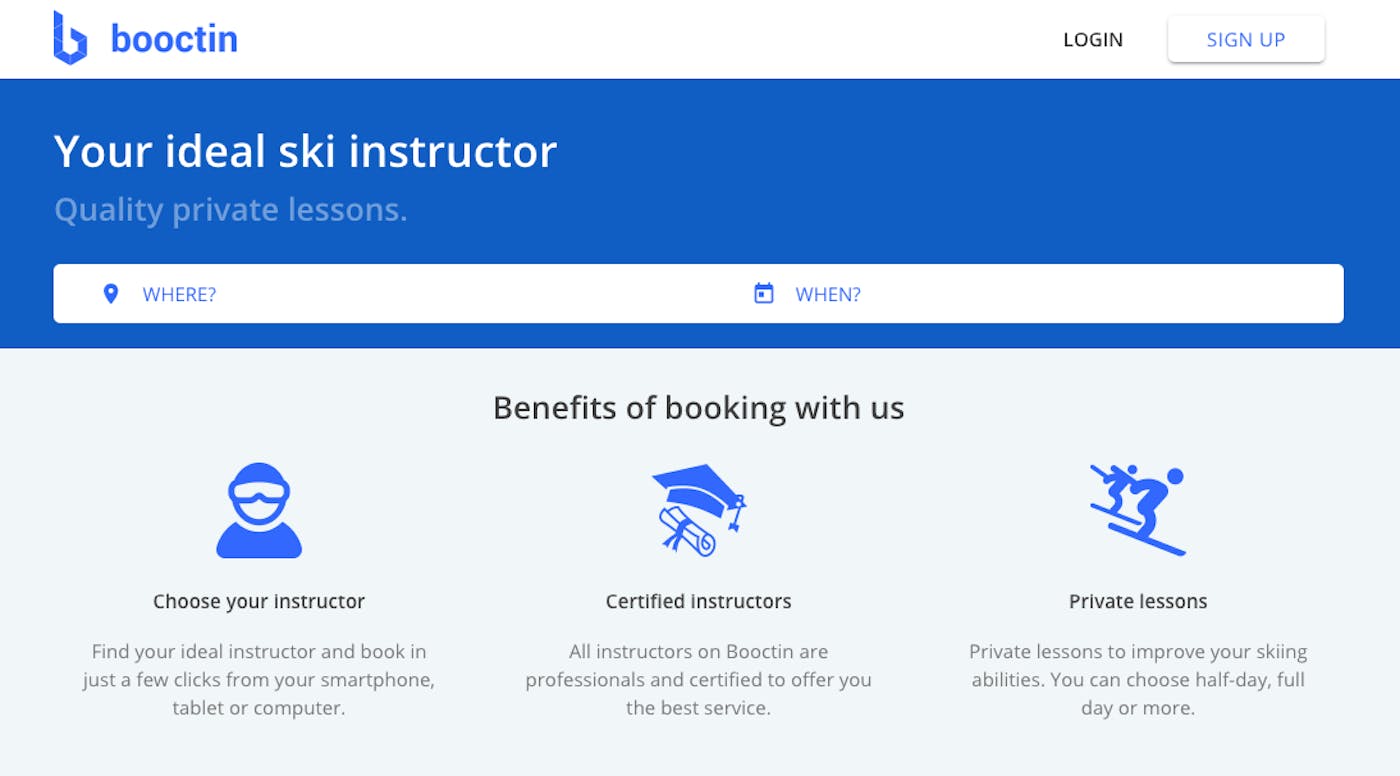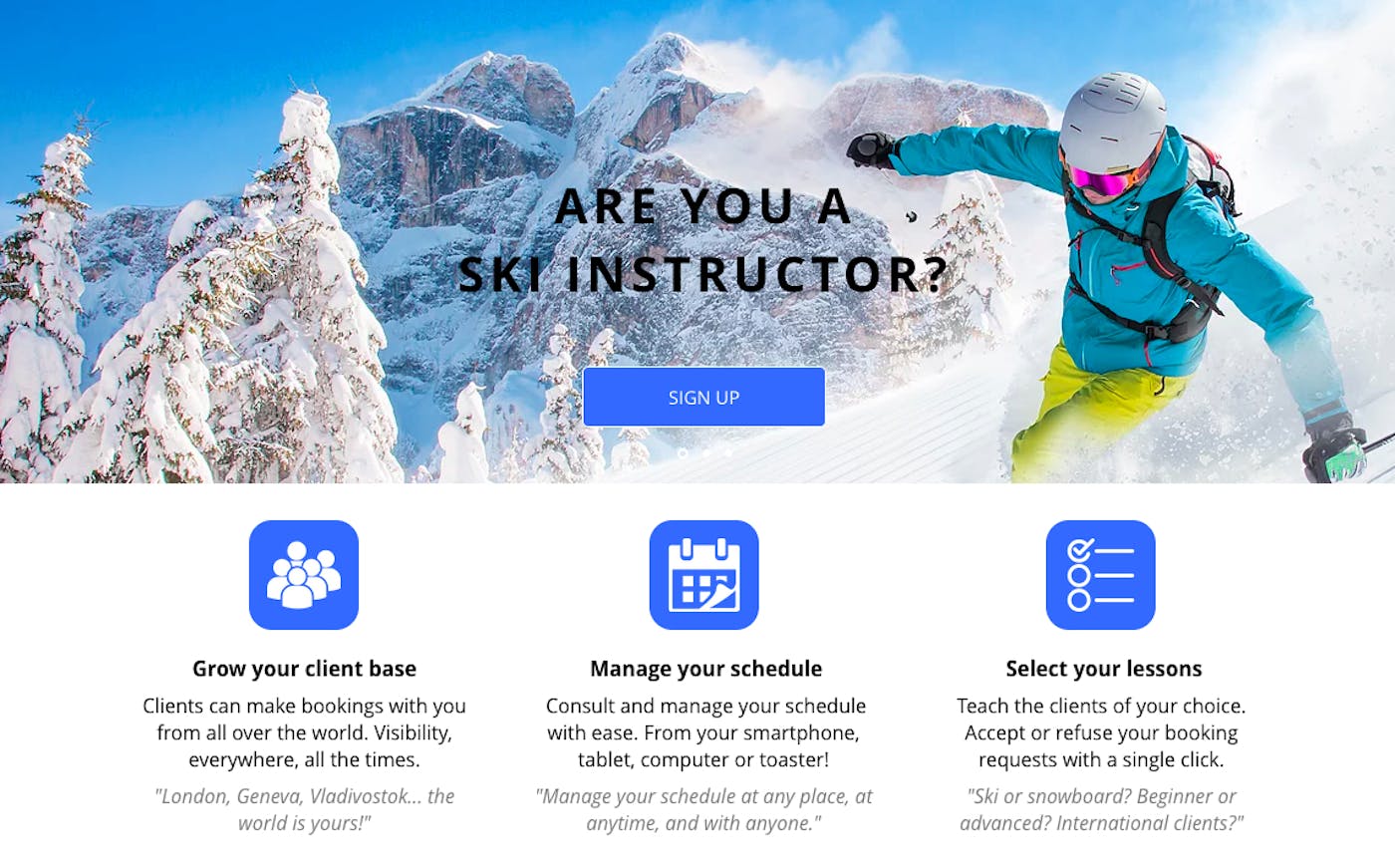How We Combined Our Skills and Passions to Build a
Business
Hello! What's your background, and what are you working on?
Hi there, I'm Théo! I've been a software engineer for the last eight years. I'm building Booctin, a ski instructor booking platform, with a friend. We were born and raised in the French Alps, so we’ve always been around the industry and realized that it could benefit from a little digitalization.
We ended the last winter season with an average of 5,000€ worth of bookings per month.

What motivated you to get started with Booctin?
Back in 2016 I was in London working as the web team lead for a startup called LifeWorks. Life was good, but I felt that I spent too much time reviewing code instead of writing code.
I met with my friend in Paris, and he pitched me this idea of an online booking platform for ski instructors. Being an instructor himself, he experienced the limitations of the current system firsthand. On the client's side it was nearly impossible to choose and book a specific instructor online. You have to call up a traditional ski school, and you're then assigned an instructor. On the instructor's side, it often feels like ski schools are too constraining and demand fees that are too high. There are independent instructors but it's harder for them to find clients and steady work.
So, just like that, my friend took a sabbatical and I quit my job and moved back to France to start building the MVP. We started out in July with some savings, but not a lot. The plan was to move fast and try to have the product ready for the upcoming winter.
What went into building the initial product?
It's always easier when you have a developper in the team :). We split the work between development and essentially everything else. I built the product from DNS to CSS (Full-stack with Clojure/ClojureScript <3) while he handled content, legal, acquisition, finance, etc.
It took four to five months from the first line of code to the site being live with all the MVP functionalities we wanted. The design was pretty rough but I used a CSS framework (Materialize), so without too many worries we had a fully responsive web app.
We wanted something simple because we believed that "simplicity is the ultimate sophistication.” That's why we reduced the scope to private ski lessons only — the minimum unit a client could book on the site was a half-day.
Given that we retreated back to our parents’ chalet in the mountains, we spent very little while developing the product. However, we wanted to raise money to support our future marketing efforts. Thankfully some of our friends and family considered our idea no-brainer, and we managed to raise around 60k€ to get things off the ground.
How have you attracted users and grown Booctin?
This is when things got harder.
First, we followed Brian Chesky’s advice to figure out the supply side of our platform first, meaning we had to find instructors. We had email listings of independent instructors (the product was primarily designed for them) and we also knew a bunch through my friend's connections. We thought that it'd be easy enough to simply email them and get them signed up. We were so, so wrong.
Getting instructor signed up to the platform turned out to be really tough. Competitors launched at the same time, so instructors were flooded by calls and emails. In response to the new competition, traditional ski schools decided to forbid their instructors to sign up on platforms like ours while teaching at their schools. And as it turns out, good independent instructors already have plenty of clients, so they don't need us as much as we thought they would.
Getting instructors on the platform was tedious, and the solution for us was to offer a sort of sign-on bonus. We ran Facebook ads stating that we would add 50€-100€ to their first booking payment received. Instructor referral didn't work at all.
On the demand side we had been quite lucky to find a channel that would convert well: Google search. There seemed to be a substantial amount of searches with keywords in the format of "ski instructor + [resort]". We tried to make the web app as friendly as possible for search engines, but being a new platform competing against ski schools which had been there for 70 years did complicate our endeavor.
Since we raised money, we were able to pay for Google Adwords, and this is still our main channel for client acquisition.

What's your business model, and how have you grown your revenue?
We take a double fee (like Airbnb) on the bookings: 7% from the client and 3% from the instructor. We wanted the instructor fee to be as low as possible to make Booctin attractive for them. Given our product, we were able to charge from day one. Oddly enough, our first booking was made from Jupiter, Florida! We started with Lemon Way as the payment system since it was cheap and seemed like it would get the job done. Big mistake. We've now switched to Stripe. It's pricier, but for us it’s been worth it.
Our first winter was about MVP testing, and our numbers were what we consider to be humble. We pulled in around 10k€ total (Jan 1k, Feb 4k, Mar 3k, Apr 2k). Second winter was a bit better, bringing in about 20k€ total (Jan 3k, Feb 9k, Mar 5k, Apr 3k). That's definitely not exponential growth but we're seeing a potential product market/fit.
Having revenues only during one season is a challenge, so we tried to expand to other mountain activities (like mountaineering, hiking etc.) but couldn't find the same demand we had for the ski platform. We're now focusing all our efforts on the ski platform, but have come to realize that we need to be very lean and patient, and have another job to survive :).
What are your goals for the future?
Our goals are to reach profitability and hopefully pay ourselves a little bit in 2020. A target of 100k€ seems reasonable if we keep running an extra lean operation, which seems feasible. Doing the product development myself saves a lot of money.
As mentioned, we have to and do have other jobs, so the main challenge will be to find time to keep this fun project alive.
What are the biggest challenges you've faced and obstacles you've overcome? If you had to start over, what would you do differently?
We got instructor acquisition all wrong. We're admittedly bad business developers, so we should have had a sales guy in our founding team.
Building the entire platform for mountain activities only to find out that the market was not big enough was also a bit of a blow. We thought we could replicate easily and move into other outdoor activities, but it's never that simple. There's no such thing as copy/pasting in the startup world :D.
Have you found anything particularly helpful or advantageous?
Being the person responsible for building the product, I needed to be extremely focused. Reading Deep Work: Rules for Focused Success in a Distracted World helped me find a productive routine.
What's your advice for indie hackers who are just starting out?
If you're building a tech product, make sure to have a tech person on your team. It will save you a lot of money and stress. Also, keep in mind that marketplaces are hard because you have twice the amount of work. Do you best to plan for that.
Above all else, try to enjoy the journey ;).
Where can we go to learn more?
Hit me on Twitter @teawaterwire. There are also a bunch of articles (in French, sorry!) on our Medium.
